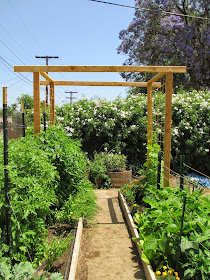Looking for a sturdy tomato or bean trellis? Why not make your own?
Perhaps last year your tomatoes outgrew their little wire cages you bought at the hardware store and you want to give them more room to grow this year. This trellis is 7 ft high and spans 6 ft over my garden pathway providing plenty of room to grow.
The trellis is made so it can be taken apart for storage. The 2 cross boards at the top can be unbolted so that the 2 side parts can be set against each other to take up less space when stored.
Here's what you need:
Lumber (see below)
(12) 3 inch wood screws
(4) corner brackets
(4) 4 inch bolts, with 4 matching nuts and washers
Twine
Wire
Drill, drill bits
Carpenter's square
Tape measure
Screwdriver
Level
Lumber: Use untreated lumber. Treated lumber has chemicals which can contaminate the soil.
These are the measurements I used, make adjustments to fit your needs.
(4) 2 x 4's 8 ft long. These are the vertical posts.
(2) 2 x 4's 4 ft long. These are the top pieces that connect the vertical posts and hold the twine.
(2) 2 x 2's 4 ft long. These are the bottom pieces that hold the twine.
(2) 2 x 4's 8 ft long. These are the pieces that are bolted across the top to connect the 2 side parts completing the trellis.
First you will make 2 side parts which will look like this. These will hold the twine.
Drill holes every 6 inches in the top pieces. Use a large diameter drill bit so that you can pass the twine through the holes.
In the vertical posts, drill a hole 1 inch from the top. This is the hole for the bolt so use the correct size drill bit to match the bolt.
Then drill a hole for twine every 6 inches matching the holes in the top pieces.
Make your last hole in the vertical pole 23 inches from the bottom. (It doesn't have to be exactly 23 inches since the bottom ends will be buried.)
Arrange the wood on a flat surface and screw the top piece to each vertical post using 2 screws on each side. Use a carpenter's square to be sure it is at a 90 degree angle.
Then screw the corner brackets inside the corners. Note that the bracket is not centered so the hole is left uncovered. (This is the hole that the bolt goes through.)
Now screw the bottom piece (2 x 2) to the vertical posts 20 inches from the bottom. Again use the carpenter's square to be sure it is at a right angle to the vertical posts.
Next you string the twine through the holes. I found if I taped the twine to a twig it made it easier to push the twine through the holes.
Don't sting the twine through the top hole on the vertical posts. This top hole is for the bolt which holds the cross piece (see below).
Next I used wire to make cross supports to keep everything stable and square.
Once you have made two of these side parts, you are ready to connect them. Bolt the top cross pieces to the vertical posts. You will need to drill a hole through the top cross piece to line up with the top hole in the vertical post that you previously drilled. I definitely needed a second set of hands for this part.
Honestly, the most difficult part of making the trellis was making sure it was level and the posts were vertical when it was placed in the garden. I recruited the help of my husband and son and we used the level.
To be certain the trellis is stable I buried 12 inches of the vertical posts, then I attached guide wires to my raised beds using eye screws.
Here is what my trellis looks like today. Tomatoes are planted on one side and pole beans on the other. If the vines grow long enough I will string twine across the top to support the vines over the top.
There you have it, tomato and bean trellis - Andie's Way.

































































